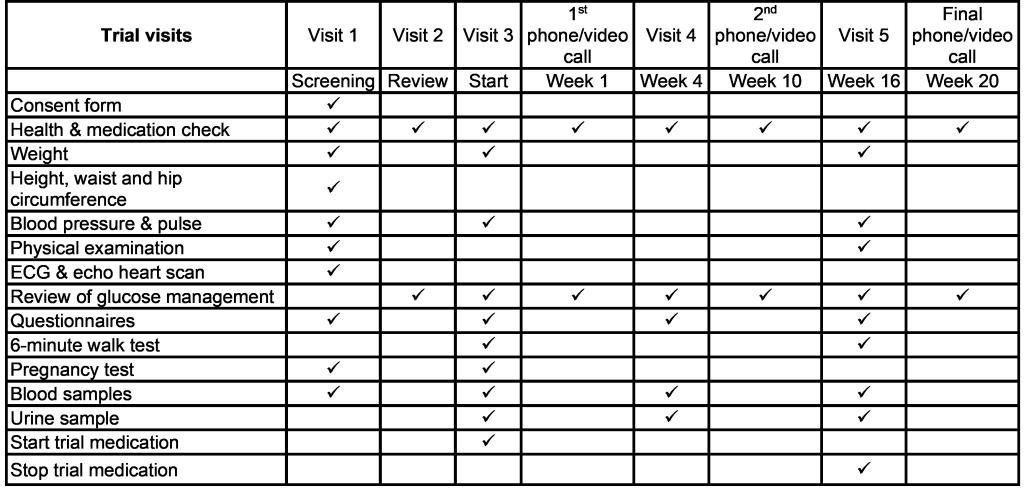Participants will be in the trial for approximately 6 months which will involve attending hospital for 5 visits and having 3 telephone or video calls with the research team.
During the trial participants will also be asked to record their blood sugar (using a continuous glucose monitor (CGM)) and ketone levels at the following times and keep a record of these readings to discuss with the trial staff at their next visit.
- Four times per day and 2 hours after changing each insulin giving set (for those on insulin pump therapy) for 3 days before and 3 days after they start their tablets.
- At least once per week for the rest of the trial.
Ketones should also be measured if:
- Sugar level is more than 11.1 mmol/L for more than 2 hours.
- Feeling unwell, even if blood sugar level is normal.
We’ll also ask participants to record any hypos (blood sugar less than 3.9mmol/L):
- For 2 weeks at the beginning of the trial
- For 2 weeks before the end of the trial
- At all times during the trial if they have a severe hypo (i.e. if they need help from someone else during the hypoglycaemic event).
Please see below further information regarding each visit/call.
Visit 1
The first appointment can take up to 3 hours and is a screening visit where we’ll carry out assessments to confirm whether the trial is suitable for the participant. At this screening visit the participant will be asked to sign an informed consent form to confirm that they wish to take part in the trial before any trial assessments take place. If they agree to take part, we’ll ask about the medicines they are taking, any illnesses, check their medical notes and carry out several assessments:
- Height, weight, hip and waist circumference.
- Pulse and blood pressure.
- Physical examination – checking breathing, heart, abdomen, and nervous system.
- ECG (electrocardiogram) – a tracing of the heart rate.
- Echo heart scan (echocardiogram, an ultrasound test) – We’ll do this if the participant has not had one in the last 2 years. This measures the function and size of the heart muscles and lasts around 30 minutes. This is usually a painless procedure although occasionally there may be a little discomfort. During the echo gel is put on the participants’ chest and an ultrasound scanner will take pictures of their heart.
- Provide a ketone monitor (if participant does not already have one)
- Completion of questionnaires about how troublesome their heart failure and diabetes are and how it impacts their quality of life.
- Pregnancy test (urine) – for women of childbearing age
- Blood samples – one of the tests will check if participant has a marker for heart failure called N-terminal pro-B-type natriuretic peptide (NT-pro BNP).
If the blood sample shows that the participant has the marker for heart failure (NT-pro BNP) and the other assessments confirm that the trial is suitable for them, they will be invited to join the trial and asked to come for the next visit.
Visit 2
This visit will take place 3 weeks after visit 1 and will last about half an hour. The main reason for this visit is to review the participant blood sugar and ketone recordings and to adjust their diabetes medication including insulin, if required. We will also be able to help participants that do not use a CGM app to sign up/create their own account if they want to.
Visit 3
This visit will take place 1 week after visit 2, last about 2 hours and include the following assessments:
- Weight, pulse and blood pressure
- Documentation of CGM data from previous 2 weeks
- Review of blood glucose and ketone levels
- Questionnaires
- 6-minute walk test
- Pregnancy test (urine), if required.
- Blood samples
- Urine sample
- Trial medication – we will supply the tablets which the participant will take for the following 4 months.
1st phone/video call (between visit 3 and 4)
This call will take place 1 week after the participant starts their trial medication (i.e. 1 week after visit 3). Recent glucose and ketone readings will be reviewed with the participant and recommendations on managing their insulin and other diabetes medication will be given.
Visit 4
This visit will be 4 weeks after the participant starts the trial medication and will take about 45 minutes. The following assessments will be carried out:
- Blood samples
- Urine sample
- Documentation of CGM data from previous 2 weeks
- Review of blood glucose and ketone levels and insulin requirements.
- Questionnaire
2nd phone/video call (between visit 4 and 5)
This will take place 10 weeks after the participant started the trial medication and will be the same as the previous call.
Visit 5
This visit will take place at the end of the participants trial medication period (i.e. 4 months after they started the trial treatment). This visit assessments will be similar to visit 3, except for the urine pregnancy test that is not undertaken, and the inclusion of a physical examination as done in visit 1.
Last phone/video call
This is the last call of the trial and will be 1 month after the participant have finished their trial medication (i.e. 1 month after visit 5). This will be the same as the previous calls.
Summary table

